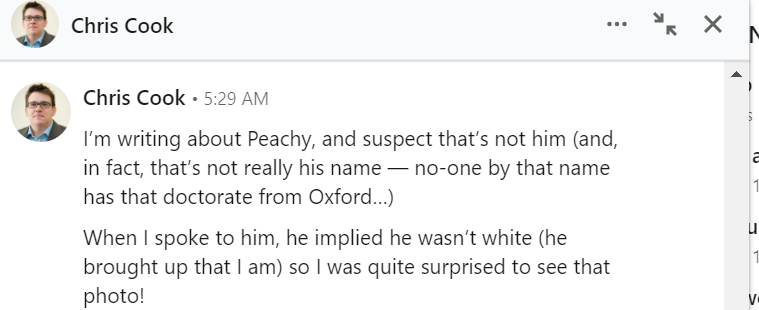Recently, Peachy Essay was the subject of a hit piece by the Financial Times. This once-respected paper has fallen far in recent years to the point where they now send reporters to harass honest essay writing and tutoring companies like ourselves or what they refer to as essay farms. In the process, the Financial Times report on buying assignments, not only lied about us, but inadvertently revealed many of the reasons why our company and others like it exist.
Peachy Essay is committed to helping students with their coursework, and we adhere to the highest ethical standards in our work. The Financial Times’ hit piece will only serve to bring more customers to us as well as expose the necessity of our services.
Peachy Essay vs. the Financial Times
FT’s article was written by a third-rate stenographer named Chris Cook, and in the process he accidentally revealed how well-regarded we are in our field. The article quotes Gareth Crossman of the Quality Assurance Agency, a public body that monitors British academic integrity, as saying we are “one of the largest-scale essay mills”. Cook also mentions that “82% [of our customers] received an upper second class degree or better“. For all of their moralizing, FT couldn’t point out a single issue in the essay they commissioned from us. It appears that buying assignment from Peachy Essay was a great choice compared to other websites and we are probably the best essay writing company out there in the market when it comes to buying high quality essays. Students who buy paper online, will only visit more frequently essay writing services (or essay mills according to QAA) after reading the FT News report on Peachy Essay.
Beyond that, the FT article inadvertently revealed that plagiarism and cheating are actually enabled by professors who lack the interest to clamp down on them. One commenter states:
“I have seen many of those, and they are actually of OK quality. I have to supervise and second mark half a dozen of master dissertations every summer, I have no hard evidence but it’s easy to tell who bought their dissertations. Those who wouldn’t ask any question and wouldn’t show you anything until the last couple of days before deadline, and when you ask them questions to clarify something they won’t answer. I let them pass with a low mark. Because I have no hard evidence and failing them means having to carry on supervising them for another half a year. The students at my university feel no qualms paying to gain advantages. Most final year UG students pay £2500 to £3000 to agencies who prepare and submit their PG applications, agents often ghost wrote the CV, the personal statements and even reference letters. My UG students would said to me: ‘My agent can write the reference letters for you, you just need to submit them.’”
Peachy Essay does not support plagiarism; our service is focused on tutoring students and providing them with valuable feedback on essay writing. Students who pass in plagiarized or fabricated work are able to get away with it due to the negligence of their teachers. If professors actually cared enough to properly teach their students and check their work, companies like ours would not exist.
Racism and Stalking from Chris Cook
FT’s attack on our company is deeply rooted in xenophobia and bigotry. Cook makes the baseless assertion that we are not based in the U.K. based on the fact that one of the people who clicked a link in an email we sent him was from Kenya. Beyond the fact that we offered to meet with Cook in person in London and were rebuffed, it’s disturbingly racist for a major newspaper to bash Kenyans in this fashion. It’s the year 2021, Britain is a multicultural and diverse country, and the imperialistic, patronizing attitudes of people like Cook should be left in the past where they belong.

This wasn’t a one-off, either; Cook has an almost-creepy obsession with the racial background of our staffers. In his communications with us, Cook asked us if our staffers were “white”. We’re surprised he didn’t ask to measure our skulls either, given his 19th-century views on race. Cook’s racism has no place in modern Britain and absolutely has no place at a respected news outlet such as FT; we demand that FT reevaluate the character of its reporters and issue an apology.
Cook’s fixation on us goes beyond his bigotry; he attempted to dox the U.K. addresses of our staffers. His article refers to the fact that we are incorporated in the U.S. state of Wyoming, which does not require shareholders and officers to disclose their names or personal information. It’s precisely because of stalkers like Chris Cook that we do not make our staffers’ private information available. Had the FT obtained our personal information, they would have likely published it, exposing us to further harassment.
The Bottom Line
It’s unclear why FT even published the article. Students are seeking out paper writing websites like Peachy Essay for help with their classwork; how is this news? The Financial Times used to be one of Britain’s most respected newspapers, writing about important topics such as Fortune 500 companies and the stock market. Now they’ve been reduced to hit pieces on law-abiding coursework writing companies. Is this worth the £309 per year that they charge their subscribers?
Moreover, FT’s article attempts to assign blame for the sorry state of higher education on companies such as ours. However, both the article and the comments reveal the rot at the heart of modern universities. Commenters such as the above-quoted one point out that plagiarism is often rewarded with passing marks from professors who don’t care about the welfare of their students. In fact, many adjunct professors work for Peachy Essay because their universities don’t pay them enough to live on. A living wage for university employees would solve this problem.
Another commenter on the FT article points out the reality that Chinese and Arab students who purchase papers for school, disproportionately rely on services such as Peachy Essay and pay for papers while studying at British universities. This is mainly because higher education has failed them. Many of these students are not taught the level of English they need to succeed in school and are admitted solely on the basis of their “international tuition fees” (which is usually three times more than home students), which is a disservice both to them and to the universities they study. These students turn to companies such as Peachy Essay because we’re the only ones interested in helping them.
The bottom line is that Peachy Essay is the solution, not the problem, to the corruption of academia. Our services are a necessary remedy to the indifference that professors show towards their students and their inability to properly educate them. That said, we are chuffed at FT’s description of us as one of the top essay writing companies in the U.K. We consider that achievement a job well done. Thanks for the free publicity, and we hope to continue serving students for a long time to come.




